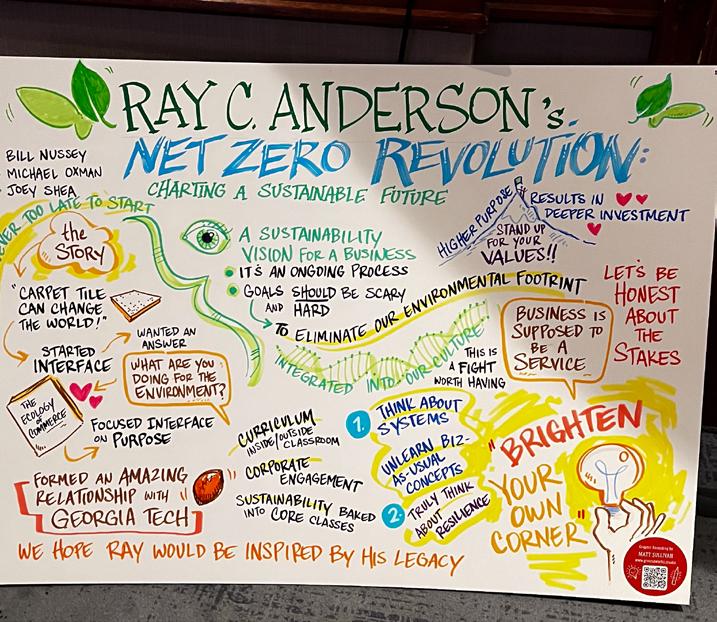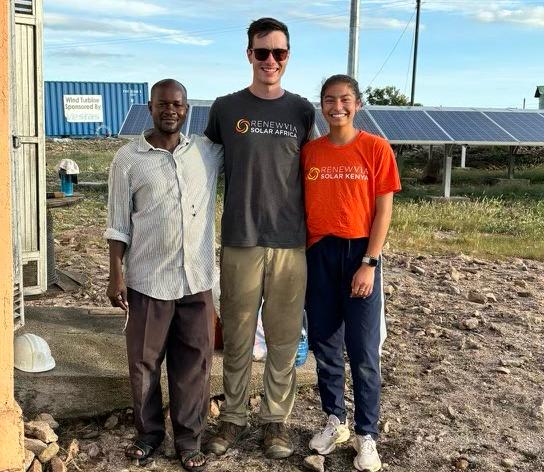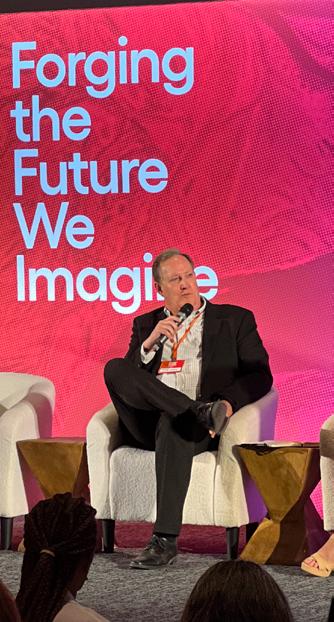
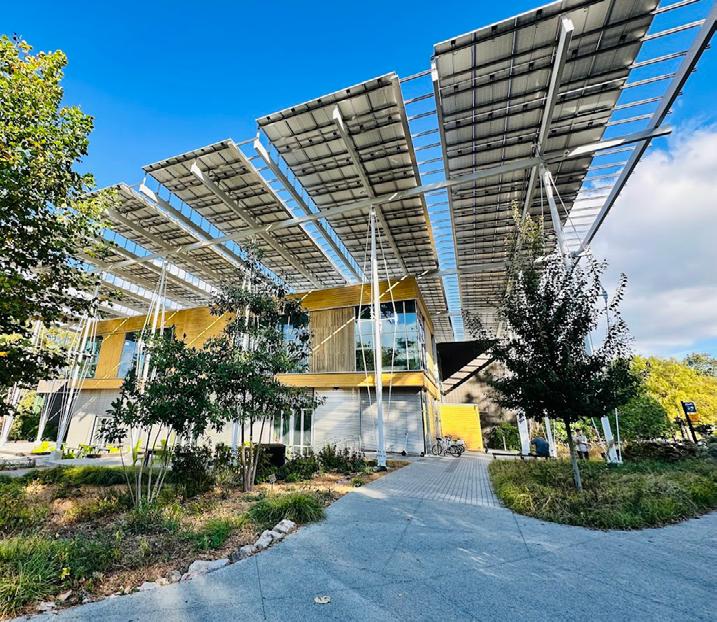
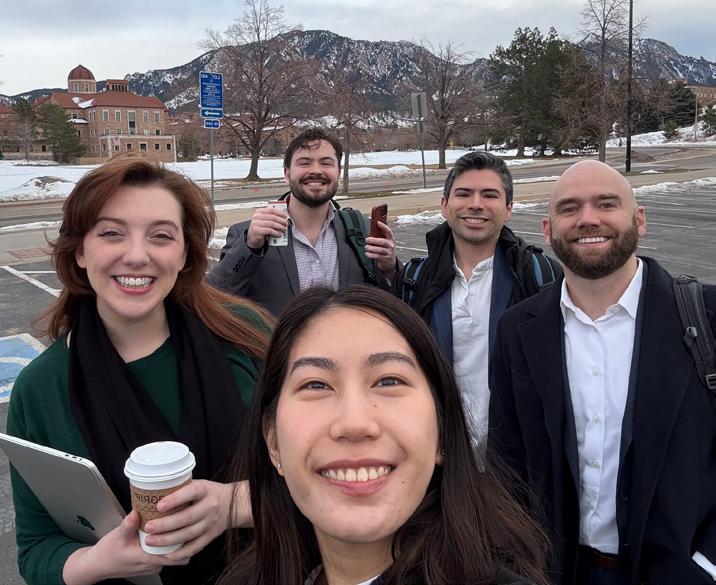



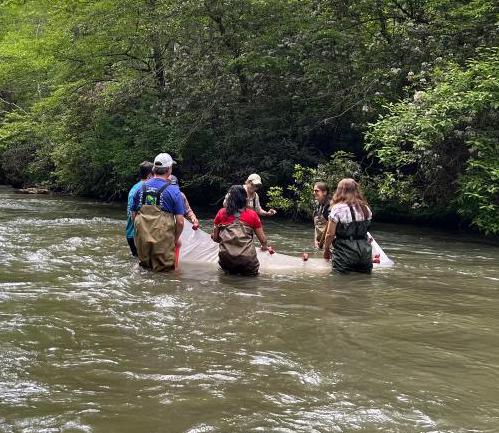
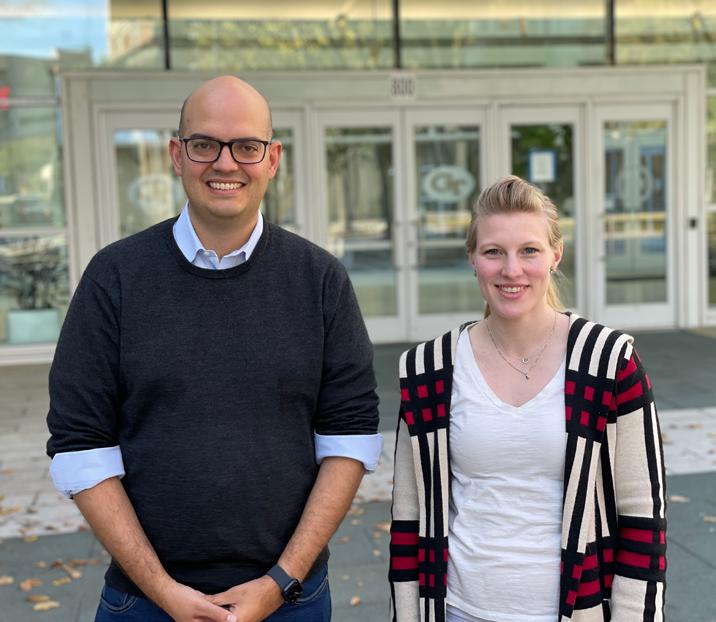
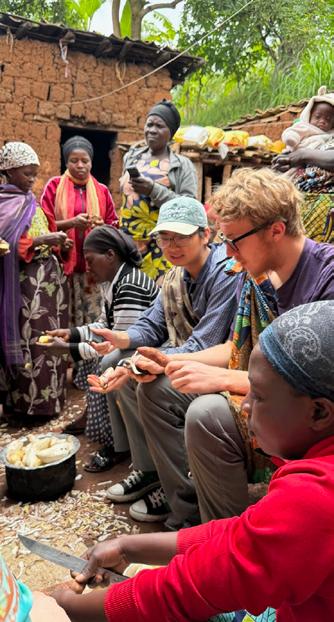
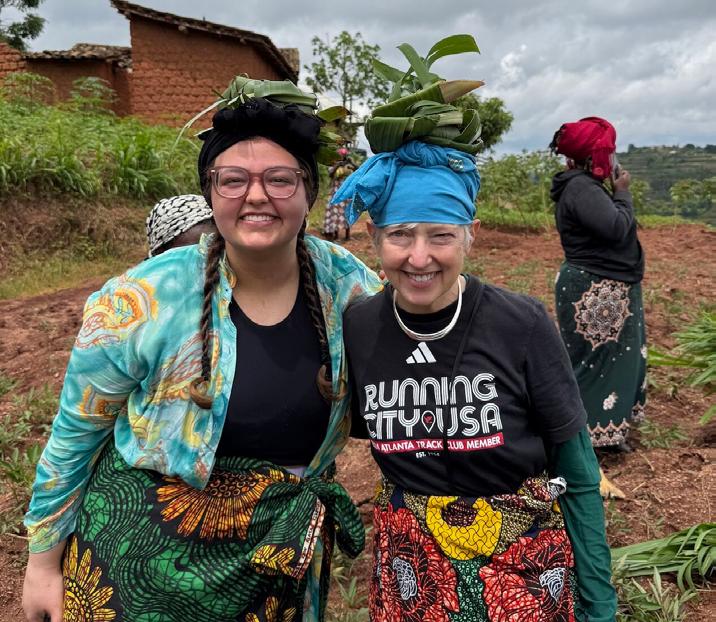
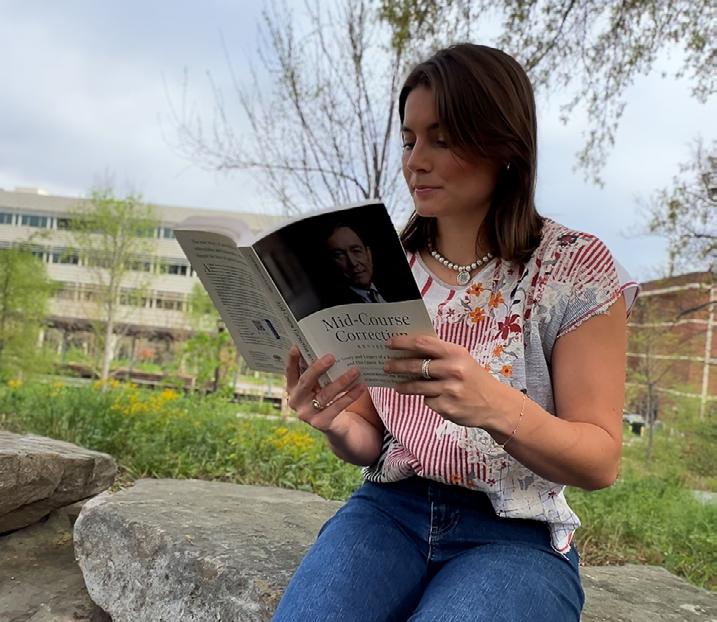
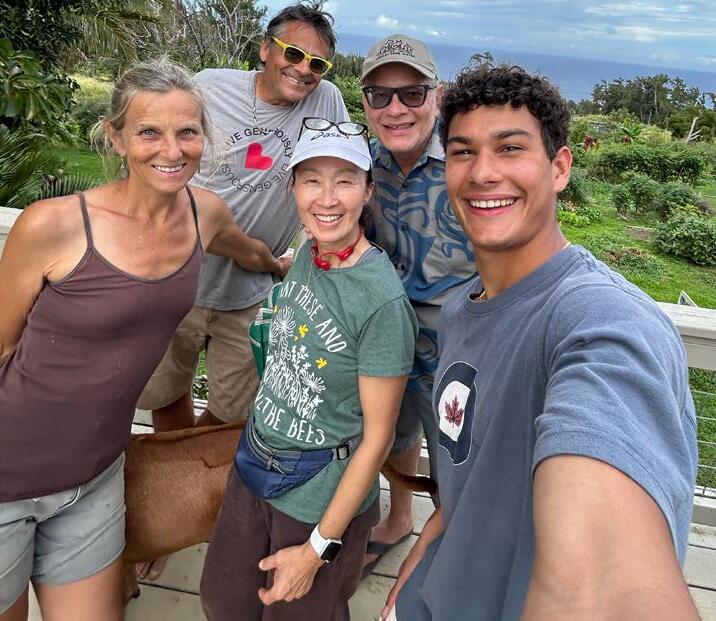
2024 -2025
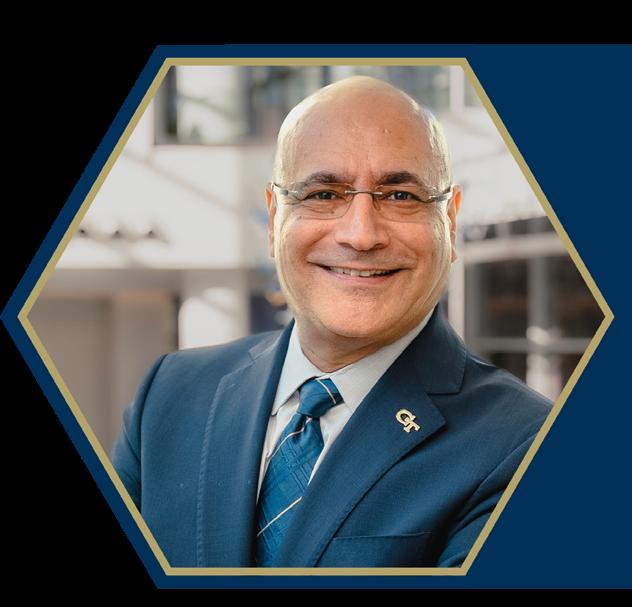
Anuj Mehrotra Dean and Stephen P. Zelnak Jr. Chair
Professor of Operations Management
Georgia Tech Scheller College of Business













2024 -2025

Anuj Mehrotra Dean and Stephen P. Zelnak Jr. Chair
Professor of Operations Management
Georgia Tech Scheller College of Business
It is my pleasure to introduce the Ray C. Anderson Center for Sustainable Business’s Annual Report. The Center is a valued part of the Scheller College of Business, helping us advance our strategic priorities:
We Are Connected: The Center connects people, places, and experiences across our community. Through collaborative faculty, student, and industry engagement opportunities, current and future leaders learn from one another. A prime example is the program for Graduate Fellows and Undergraduate Ambassadors, where approximately 30 students work with internal and external partners to conduct year-long projects.
We Are Entrepreneurial: Fostering entrepreneurs and innovators remains a key College priority, and the Center contributes to these efforts by supporting impact-oriented innovation and leadership. The success of SUSTAIN-X exemplifies this commitment. In just three years, it has become a trusted resource in helping students and faculty to develop and launch startups that address pressing environmental and social challenges.
We Are Experiential: The Center provides transformative opportunities for students to “learn by doing,” with the Sustainable Business Consulting Practicum serving as a standout example. Students consistently identify this course as one of their most impactful experiences at Scheller College, as it empowers them to solve real-world sustainability challenges for businesses.
We Are #StellaratScheller: The Center embodies excellence while building community. Staff, faculty, and students participating in Center courses and programming receive well-deserved recognition, bringing positive attention to our entire College. These accolades range from Institute- and College-wide awards to thought leadership featured in prominent publications.
I encourage you to explore the Center’s achievements in the pages that follow.
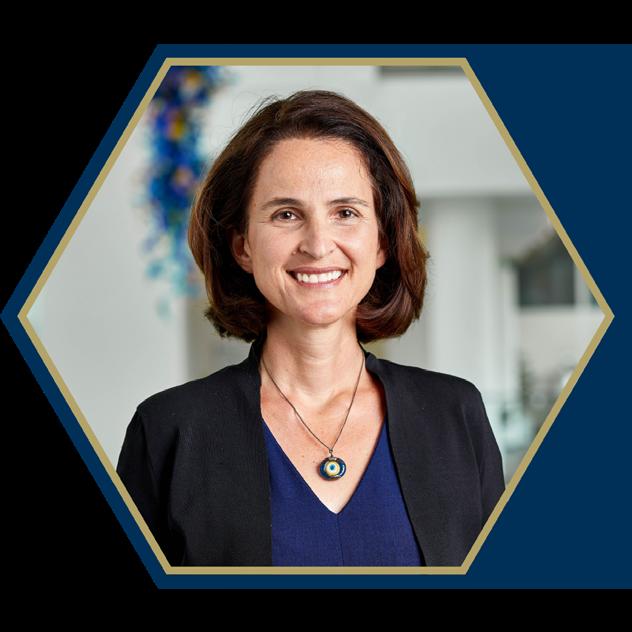
Beril Toktay Founding Faculty Director

Michael Oxman Managing Director
As we celebrate more than ten years of transformative work grounded in Georgia and global in reach, the Ray C. Anderson Center for Sustainable Business continues to accelerate its impact, driven by a vibrant community of students, industry partners, and faculty who share our vision of infusing sustainability across business education and practice.
Our students continue to inspire us daily. Today’s students recognize that sustainability encompasses both protecting our planet and caring for people, and they’re discovering countless ways to weave these principles into their professional and personal journeys. They also understand the opportunity to create business and societal value by developing innovative solutions to sustainable business challenges.
The business community’s commitment to our mission continues to expand and deepen. Companies across diverse industries are stepping forward as partners, joining initiatives like the Drawdown Georgia Business Compact and collaborating with us on innovative programs such as the Carbon Reduction Challenge. Our industry partners bring a real-world perspective to our educational programs.
We could not accomplish our goals without our affiliated faculty. These experts are pioneering educational innovation and sustainability course infusion. Their research and thought leadership advance sustainability knowledge globally.
One of the most meaningful experiences as Center directors is seeing our alumni thrive in their careers while staying true to sustainability principles.
As we share the highlights of this past year, we do so with gratitude for our entire community, with special thanks to our staff and the Ray C. Anderson Foundation.
The Center is anchored within the Georgia Tech Scheller College of Business, supporting its vision of being a global leader in education, research, and inclusive innovation to advance business and improve the human condition. Our goals also advance the Institute’s strategic plan focus areas:
• Amplify Impact
• Champion Innovation
• Connect Globally
• Expand Access
• Cultivate Well-being
• Lead by Example
We act as a catalyst and connector, bringing together students, research faculty, companies, and entrepreneurs to create an environment where business-driven solutions to sustainability challenges can be shared and thrive.
The Ray C. Anderson Center for Sustainable Business empowers the leaders of tomorrow to create sustainable businesses and communities.
Our mission is to create and share the knowledge that current and future leaders depend on to drive innovation and to integrate sustainability into their organizations and communities.
The urgency and opportunity for sustainable business practices have never been greater. Our Center focuses on amplifying our students’ passion for problem-solving, our faculty’s cutting-edge research, and the power of industry to create a better world for current and future generations. We work across four thematic areas.
• Climate Action
We focus on developing strategies to mitigate carbon emissions throughout organizations and supply chains.
• Circular Economy
We support a shift from a linear system to a circular model that makes possible the indefinite lifespan of products – from design and production through refurbishment and reuse.
• Environmental, Social, Governance (ESG) Leadership
We build on investor and industry momentum that recognizes the importance of managing ESG issues, risks, and opportunities for people, planet, and profit.
• Social Performance and Human Rights
We incorporate social dimensions and related frameworks on topics such as diversity, equity, and inclusion as well as human rights to ensure positive business impacts and benefits for stakeholders.


Ray C. Anderson (IE ’56, Honorary Ph.D. ’11), after graduating from Georgia Tech in industrial engineering, started a career in textiles. In 1973, he founded his own company later called “Interface.” It would eventually become the world’s largest manufacturer of modular floorcovering. By 1994, Interface was successful by every business metric. However, when asked what Interface was doing for the environment, Ray was unsatisfied with a response limited to regulation and compliance. He sought inspiration and guidance from The Ecology of Commerce, where he encountered Paul Hawken’s assertion that industry is both the sector responsible for the greatest amount of environmental harm as well as the only sector with the necessary size and capital to turn things around. Hawken’s words led to a “spear in the chest” moment for Ray. From that moment, he committed the rest of his life to making Interface a breakthrough leader in corporate sustainability and to advocating for a paradigm shift in business thinking. Ray believed fundamentally that when done right, business can be a force for good in the world. We are honored to continue his legacy by educating “the Ray C. Andersons of tomorrow.”


Celebrating its third year, the Drawdown Georgia Business Compact (Compact) continues to spur and sustain advances in science-based decarbonization strategies for Georgia and identify opportunities for collective action in the state. The Compact has generated widespread interest among leaders in the business community – consistently growing year over year with members from companies across a variety of industry sectors. “This year, we’ve made great strides in building a strong community of practice and a set of actionable initiatives,” said David Eady, director of industry engagement. “Compact members bring their best ideas to their peers, inspire action on climate change, and work together toward meaningful solutions that help their organizations meet their business and carbon reduction goals.”


The sustainability community from Georgia and beyond came out in full force to share the latest innovations in the space at Super South. The Compact provided organizational support and co-sponsorship for the summit on climate innovation and impact. The keynotes, breakout sessions, innovation expo, capstone project exhibition, and documentary films explored six program themes: clean energy, smart communities, the land, H2O, industry and infrastructure, and smart lifestyle.



Representing a major focus for 2025, the Compact is developing programs and kicking off outreach to key stakeholders to leverage collective impact on one of the biggest challenges for companies in meeting their carbon emission goals – Scope 3 emissions. These indirect greenhouse gases discharged across a company’s value chain account for anywhere between 70% and 80% of an organization’s overall carbon footprint.
Southface hosted an in-person stakeholder meeting of the Compact renewable natural gas (RNG) working group focused on advancing Georgia’s RNG market. The event featured the release of the RNG Georgia Market Mobilization Report and a Mapping Tool developed with the Georgia Tech Center for Spatial Planning Analytics and Visualization, highlighting opportunities and challenges in Georgia’s RNG market.
Compact member Retaaza is a thriving B Corp and social enterprise focused on sustainable solutions. With one out of every seven Georgians experiencing food insecurity, the need is great for a scaled solution to make local food more accessible. “I think of us as air traffic control for resources around the local food industry,” says Kashi Sehgal, CEO and founder. “We get dollars to farmers; we get healthy, nutritious food to our neighbors; and we get education to everyone else.”
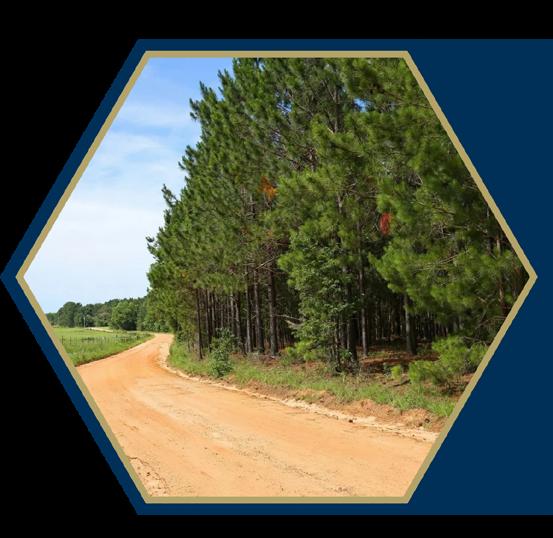
In a by-invitation workshop, the Compact brought together leaders in the forest carbon space to share the latest information and insights on carbon reduction, growing marketplace solutions, and resources available to reduce emissions. Georgia is home to more than 22 million acres of working forests and expansive coastal wetlands, which are vital to combating climate change. The Compact supports enhanced carbon sequestration capacities in tandem with essential emission reduction efforts among businesses across the state.



The Compact co-hosted a sustainable aviation fuel (SAF) workshop. The abundance of feedstocks and robust transportation infrastructure present great potential for the Southeast to emerge as a hub for SAF production. The workshop brought together multiple stakeholder groups representing federal, state, and local government, industry, academia, and the aviation sector, to identify opportunities for establishing the Southeast as a national leader in SAF.
At the Georgia Healthcare Sustainability Forum, co-hosted by the Compact, healthcare industry leaders, hospital administrators, and clinicians addressed the role of healthcare in reducing carbon emissions and improving sustainability. Triniece Smith, the Center’s administrative professional, who is also a graduate student in public health, wrote a reflection on learning how two of her interests, sustainability and healthcare, intersect.
Compact members CompostNow, Better Earth, and YKK announced advances in materials circularity. New initiatives included the launch of a new hard-to-recycle pickup service, the introduction of an expanded line of compostable foodservice packaging, and a program to extend the lifespan of products in the apparel industry.

Scale Lab offers continuing support for social entrepreneurs who complete the CREATE-X Startup Launch. Building on the success of entrepreneurship incubators CREATE-X and SUSTAIN-X, Scale Lab provides mentoring tailored specifically for founders of startups that aim to be profitable and make a positive environmental or social impact. Scale Lab’s monthly sessions provide skills development, case studies from sustainability startups, and peer-to-peer problem solving. Virtual team coaching sessions offer additional support for founders and team members.


The Center selected 28 graduate and undergraduate students as Scheller College Graduate Sustainability Fellows and Undergraduate Sustainability Ambassadors. Participants deepened their engagement in sustainability by working on projects related to equitable home weatherization, sustainable AI, food waste reduction, and more. At the end of the academic year, they produced videos about their work.
“The Carbon Reduction Challenge provided new avenues for me to make a real impact. Working with peers, professors, and staff members, I learned effective communication and business skills and developed resilience to push through adversities, ultimately completing the project. I am so grateful to be a part of this program!”


The Carbon Reduction Challenge wrapped up its eighth summer with a Final Expo that showcased the innovative and impactful sustainability solutions proposed by participating college students. The Expo highlighted the creativity and practicality of projects aimed at reducing carbon emissions and saving money for companies and the Georgia Tech campus. First prize was awarded to Team MotionGlow for an energy-saving proposal for a dorm.

Amanda Ehrenhalt, a Stamps President’s Scholar and industrial and systems engineering major, shares lessons learned from a transformative summer internship with Renewvia Solar Africa. The internship solidified Amanda’s desire to pursue a career that can make a more equitable and sustainable world. The Center awarded Amanda (a 2023-24 Sustainability Ambassador) with a small grant to help cover her travel costs.
The Sustainable Business Consulting Practicum helped me understand how to approach sustainability from a consulting and business strategy perspective. I’ve learned how to connect values like ethical production and environmental responsibility to broader business goals. It’s been incredibly rewarding and eye opening.”
Iris
Medina-Elston, MBA ’25 Founder, Carter Wade



Arezou Shafaghat, an Executive MBA candidate, architect, urban planner, and civil engineer, reflected on her experience visiting the Kendeda Building for Innovative Sustainable Design as part of the Business Strategies for Sustainability course. Led by Michael Oxman and Andre Calmon, the course introduces leading business practices and strategic sustainability. Shafaghat’s article explores the key role that MBA professionals can play in the design, planning, and success of energy-efficient and sustainable buildings.
At ClimateCAP, MBA students learned why climate change is a game changer for the global economy. The event brought together over 550 MBA students, business leaders, and experts to address climate challenges and how businesses are working towards carbon reduction. Shawn Johnson said, “ClimateCAP reaffirmed that sustainability isn’t just a challenge – it’s an opportunity to innovate, create value, and build a resilient future.”




Scheller’s Net Impact MBA Chapter was selected as the 2023-24 U.S. Graduate Chapter of the Year by Net Impact. Awards are given to chapters demonstrating dedication to Net Impact’s mission to inspire and equip emerging leaders to build a more just and sustainable world. Five chapters (among 300 global chapters) are honored annually.
Kate Kleiber is the 2025 recipient of the Vivian Nora Lukens Memorial Scholarship, which supports students pursuing the certificate in sustainable business. The business administration major graduated this spring and will be working at Ross. Kleiber says, “I want to apply everything I’ve learned to make a positive impact. We can’t lose sight of the fact that we have a lot of sustainability opportunities in retail.” Kleiber also shares her story in a video
Supported by a small grant from the Center, Teddy Suazo spent two weeks as a volunteer in Hawaii. Through Worldwide Opportunities on Organic Farms, he was connected with a couple who live full time on the island and operate a small, regenerative organic farm. The experience taught him about issues relating to Hawaii’s heavy dependence on imports and the disruption of local agriculture.
In an interview, Emily Schroeder, BSBA ’24, a Carbon Reduction Challenge alumna, shares her educational journey. Schroeder chose operations and supply chain management as her concentration largely because of her interest in sustainable business and wanting to learn more about how global supply chains work.

The Center completed its second cycle of grants through the Educational Innovation Initiative. Led by Ravi Subramanian, faculty director of educational innovation, the initiative provides support to faculty (in a variety of disciplinary areas) who commit to implementing sustainability into their courses and pedagogy. The initiative ultimately serves students interested in acquiring sustainable business competencies in Scheller programs, from undergraduate to graduate and executive education. Eight faculty members completed projects.


Katie Badura infused two new case studies that showcase sustainability into the MBA core course, Leading People and Organizations. Students now consider the role of sustainability when covering the topics of creativity, innovation, organizational culture, and organizational change.
Justin Blann infused sustainability content in managerial accounting classes for undergraduate and graduate students. His course emphasizes emerging and contemporary business trends and their intersection with traditional cost and managerial accounting topics. New course content explores sustainability and other environmental, social, and governance topics.
Ryan Blunck added a sustainability reporting module to his core MBA course, Financial and Managerial Accounting. Sustainability reporting is important because it connects business performance with environmental and social impact, enabling organizations to create long-term value while demonstrating transparency and accountability to stakeholders.
Abhishek Deshmane updated course content in Revenue Analytics for undergraduates and MBAs. Students learn about the balance between profitability and social responsibility, and the long-term implications of pricing strategies on product/service access, repeat interactions, and brand reputation. The course equips students with a holistic understanding of revenue management that includes the potential societal impacts of their decisions.
Chris Gu infused sustainability content into the core undergraduate course, Management Statistics. A new module introduces the application of statistical concepts to sustainable business operations, governance, and beyond. Statistical techniques are applied to business challenges such as carbon emissions reduction and workforce scheduling optimization.
Tim Martin infused sustainability content in the core MBA course, Operations Management. In-class discussions and exercises draw upon Martin’s experience of working at a clean energy firm for 15 years. Topics such as product development, management of technology, and operations strategy all now contain a sustainability component. Two new sessions focus on case studies about building sustainability into supply chains.
Morvarid Rahmani infused sustainability into the core MBA course, Operations Management. Students learn to apply operational concepts to integrate social and environmental impacts with financial objectives. A new course topic is an operational perspective on creating and measuring impact.
Deborah Turner infused sustainability content in an Evening MBA course, Financial & Managerial Accounting. The new content introduces the integration of ESG metrics across both financial and managerial accounting. At the end of the course, students should be able to integrate ESG metrics to facilitate good business decisions across a wide range of financial reporting and managerial decisions.



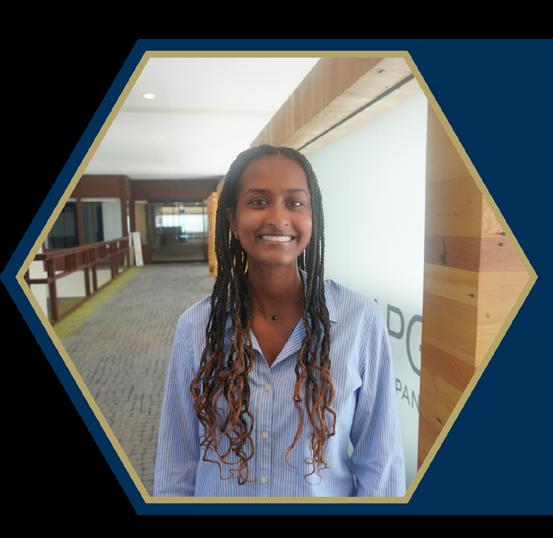
Faculty Director Beril Toktay contributed to an article in The Conversation. The authors state, “The road to net-zero emissions will be bumpy. Yet the rapid growth of global corporate commitments, as well as action by a wider range of companies at the regional level, suggests corporate efforts are nevertheless moving forward.” Toktay also discusses working toward net zero in a Scheller Business Insights video
“We’re always eager to see how our Compact members meet their sustainability goals with fresh thinking and innovative climate solutions,” says Titiksha Fernandes, an extension professional for the Compact. “By leveraging the power of collaborative networks like the Compact, companies can share resources, learn from each other, and even foster cross-sector cooperation.” These efforts amplify collective impact, steering the state toward a net-zero future.
As a participant in the year-long Institute for Georgia Environmental Leadership program, Allison Bridges, an extension professional for the Compact, explored and learned at numerous environmentally significant locations around the state – from the “tumbling waters” of North Georgia to the Southeast’s most sustainable building (in our own backyard).
Public policy major Sarah Hailu wrote a reflection about our event, “The Chevron Doctrine Overturned.” Recent shifts in administrative law are poised to reshape the way businesses navigate regulatory compliance and risk management. This event brought together a panel of legal experts from Smith Gambrell Russell, LLP, and Burt Fealing, general counsel of Southwire Company.

On an episode of Scheller Business Insights, affiliated faculty member Karthik Ramachandran identifies crucial skills every founder needs to possess to ensure their business will succeed over time. Drawing on his research, he believes developing critical decision-making skills is essential, including learning how to take customer feedback and knowing whether to stay on course or pivot when faced with a particular challenge.
Karthik Ramachandran, Professor of Operations Management
Judy Adler Georgia Environmental Finance Authority
Naveed Ahmad, MBA ’19 Schneider Electric
Jack Allen Cisco Systems
Stephanie Armistead Chick-fil-A
Mark Callaway Morgan Stanley
Anthony Coker, ChE ’84 Shell
Amelia DeLuca Delta Air Lines
Bruce Edelston Energy Policy Group, LLC
Casey Erb, EnvE ’20 Mortenson
John Federovitch, CS ’99 VMware
Chris Hagler, MS MoT ’93 Independence Point
David Hogan, Mgt ’10 Clover Returns Management Solutions
Ben Jordan, PhD PP ’12 The Coca-Cola Company
Tori Kaplan Truist
Cheryl Kortemeier Corporate Volunteer Council of America
Bob Lax Accenture (retired)
Liz Minné, MSE ’10, MS EnvE ’13, PhD EnvE ’15 Interface
Ira Pearl, ChE ’85 NextEra Energy Resources
Tom Pennella Penhalt Advisory Group, LLC
Andrea Pinabell AC Impact Advisors, LLC
Denise Quarles Siemens
Bo Quick, IE ’93 Southwire Company
David Rachelson Clover Environmental Solutions
Josh Raglin Norfolk Southern Corporation
Charles Redding, ChE ’85 MedShare
Elizabeth Schultz, ID ’12, MBA ’17 ScottMadden, Inc.
Joey Shea Interface
Nathaniel Smith Partnership for Southern Equity
Jacquie Smyth, MBA ’18 Mativ
Akissi Stokes WUNDERgrubs
Tim Trefzer Honeycomb Strategies
Stephanie Valdez Streaty Cox Automotive Inc.
John Wells, IM ’84 The Goodwin Group
Dave Williams, Mgt ’89 Metro Atlanta Chamber
Jennifer Winn Georgia Power

The MBA education Tommy Bledsoe, MBA ’20, received at Scheller – core competencies, a concentration in sustainable business, and extracurricular activities – helped him thoughtfully weather a graduation at the height of COVID and eventually transition to a sustainability-focused career. Tommy now serves as a senior sustainability specialist at CBRE, where he leads client services delivery for the Eastern U.S. as part of the property management sustainability program.

For the past three years, Jennifer Chirico (Mgt ’97, PhD PP ’11) has been leading efforts to make the Georgia Tech campus more sustainable. As the inaugural associate vice president for sustainability, the proud Double Jacket works with the Infrastructure and Sustainability team to make sure our campus is making strides toward lowering emissions and waste while also saving the Institute money. This “everybody wins” scenario is good for the planet, our community’s health and wellbeing, and the Institute’s bottom line.
In my opinion, one of the big successes for Georgia Tech’s Climate Action Plan is that it is feasible and realistic – not idealistic. It’s a good road map for making our campus more efficient and cost effective.”
Jennifer Chirico Associate Vice President of Sustainability

@GT_ACSB
@drawdowngabusiness
Drawdown Georgia Business Compact


The great work we’ve been able to accomplish over the last year has been empowered by philanthropic support. This investment fuels our mission to educate, innovate, and engage with business to create a sustainable future.
• High-Impact Programming
We are preparing the next generation of changemakers to turn bold ideas into action. Through initiatives such as the Carbon Reduction Challenge, SUSTAIN-X, and the Sustainability Fellows & Ambassadors Program, students design solutions with measurable environmental and economic benefits. Your support drives the innovation, entrepreneurship, and student success that are at the core of our mission.
• Educational Innovation
We are reshaping business education for a sustainable future through initiatives such as the Sustainable Business Certificate, the Sustainable Business Consulting Practicum, and faculty innovation grants. We support students with experiential learning in the classroom, companies, and communities both nationally and abroad. Our initiatives also fuel faculty research and new course design. Your partnership directly supports the experiences and expertise that position Scheller at the forefront of sustainable business.
• Industry Engagement
We are engaging companies of all sizes in accelerating research-based climate solutions across Georgia through the Drawdown Georgia Business Compact. Seventy-plus members of the Compact are working to reduce emissions, share best practices, pioneer net-zero strategies, and scale solutions through Compact convenings, our collaborative workspace, and the new Small Business Accelerator. Your investment drives industry change and positions Georgia as a leader in sustainable business.

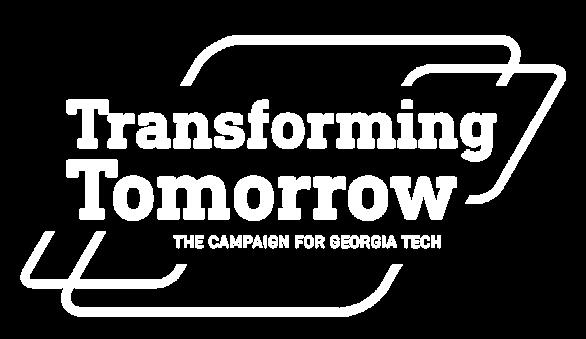
Michael Oxman Managing Director





